MercoPress. South Atlantic News Agency
Tag: Argentina Central Bank
-
Friday, January 30th 2026 - 09:30 UTC
Argentina’s central bank extends dollar-buying streak, pushing reserves to a Milei-era high

Argentina’s central bank (BCRA) posted another net purchase in the foreign-exchange market on Thursday, buying US$52 million and logging a 19-session streak of net buying, according to figures reported by local media. Over that run, the bank accumulated US$1.134 billion, while gross reserves rose to US$46.24 billion, the highest level since 2021 and the strongest reading since President Javier Milei took office.
Add your comment! -
Tuesday, December 16th 2025 - 09:59 UTC
Argentina's Central Bank to loosen up leash on US dollar
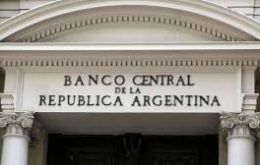
Argentina's Central Bank (BCRA) announced Monday a twitch to its foreign exchange policy, which was welcomed by the International Monetary Fund (IMF). The new strategy seeks to further boost reserves and will become effective in January 2026.
-
Friday, July 18th 2025 - 10:43 UTC
Moody's upgrades Argentina's rating with positive shifting
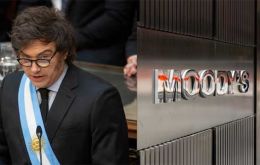
Moody's has raised Argentina's foreign and local currency credit rating from Caa3 to Caa1, also shifting the outlook from “stable” to “positive.” This upgrade reflects Moody's view that Argentina's broad liberalization of exchange and capital controls, coupled with a new program with the International Monetary Fund (IMF), will improve the availability of foreign currency and ease pressure on external finances.
-
Friday, January 17th 2025 - 09:15 UTC
Argentina accepting other currencies besides pesos
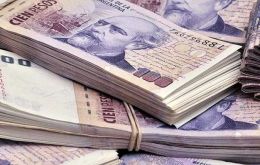
Effective Friday, Argentines will be allowed to fill out price tags in the currency of their choice (most likely US dollars), the Central Bank (BCRA) announced Thursday, in what has been regarded as a first step towards the dollarization of the economy, one of President Javier Milei's electoral promises.
-
Sunday, October 1st 2023 - 10:25 UTC
Argentine presidential candidate Milei: “Should we dollarize?” or rather “Why should we keep the peso?”

Next 22 October a presidential election will take place in Argentina, South America's second-largest economy and three candidates are competing for the job, Sergio Massa, the incumbent, Patricia Bullrich, from the traditional opposition when two coalitions prevailed in the Argentine political system, and Javier Milei, a declared libertarian, economist, and if published Argentine opinion polls can be trusted, the front runner.
-
Thursday, July 20th 2023 - 09:17 UTC
Buenos Aires: “Blue” dollar keeps going up amid police raids
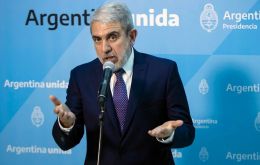
Argentina's Central Bank (BCRA) Wednesday sold US$ 130 million and 288 million yuan (around US$ 40 million) in a desperate move to keep the “blue” (a euphemism for “black market”) quotation from soaring any further after reaching AR$ 527 / US$ 1.
-
Friday, May 26th 2023 - 09:07 UTC
Argentina imposes more impediments to foreign trade; Central bank desperately short of US dollars
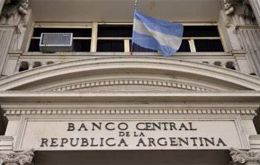
Given the financial problems and shortage of foreign currency, on Wednesday, May 24, the leading shipping company MSC, followed by seven others, announced that, as from June, ‘freight collect’ will be charged for exports from Argentina, meaning that these charges will be billed to the party receiving a shipment, often called the consignee.
-
Friday, March 17th 2023 - 08:48 UTC
BCRA adjusts benchmark interest rate: 78% annually

Argentina's Central Bank (BCRA) Thursday decided to raise the benchmark interest rate by 300 basis points to 78% annually, it was announced in Buenos Aires the day after the INDEC said the Consumer Price Index for the month of February ad grew 6.6% for a year-on-year inflation of 102.5 %, the highest in the last 32 years.
-
Monday, July 4th 2022 - 20:43 UTC
No more foreign players for Argentine football clubs due to US dollar crisis
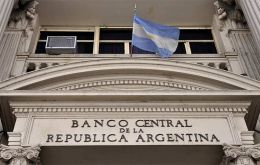
Argentina's current economic crisis is taking its toll on football. Transactions involving foreign players who were about to be hired by local clubs have been put on hold after local clubs have been rendered unable to have access to the amount of US dollars needed for the deal to go through.
-
Friday, February 18th 2022 - 10:25 UTC
Argentina’s Central Bank raises interest rates amid growing inflation
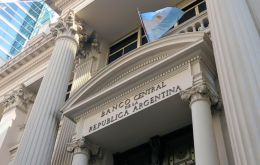
Argentina’s Central Bank (BCRA) Thursday increased interest rates to 42.5%, it was announced. The measure is consistent with recent talks between the Government of President Alberto Fernández and the International Monetary Fund (IMF).
